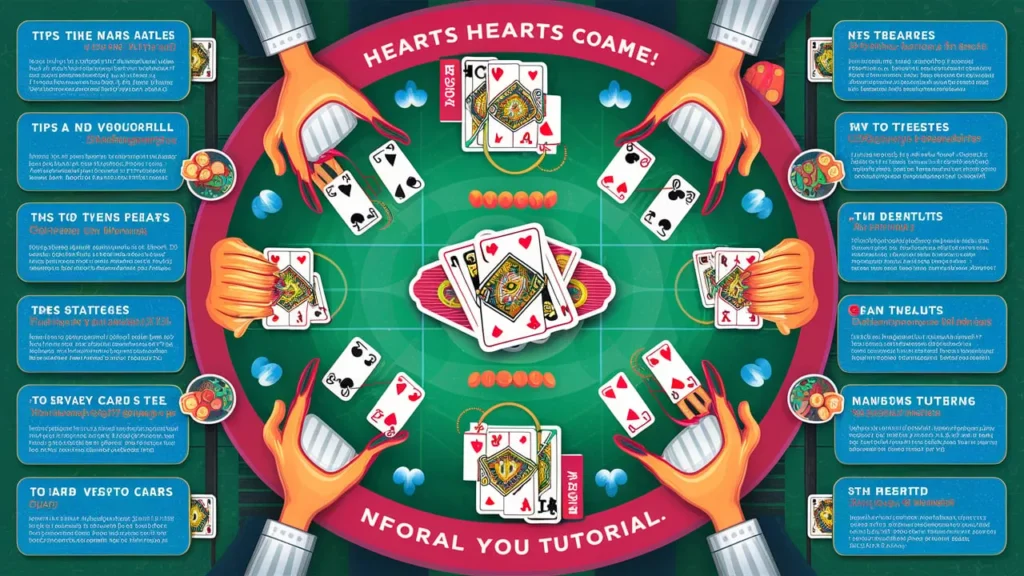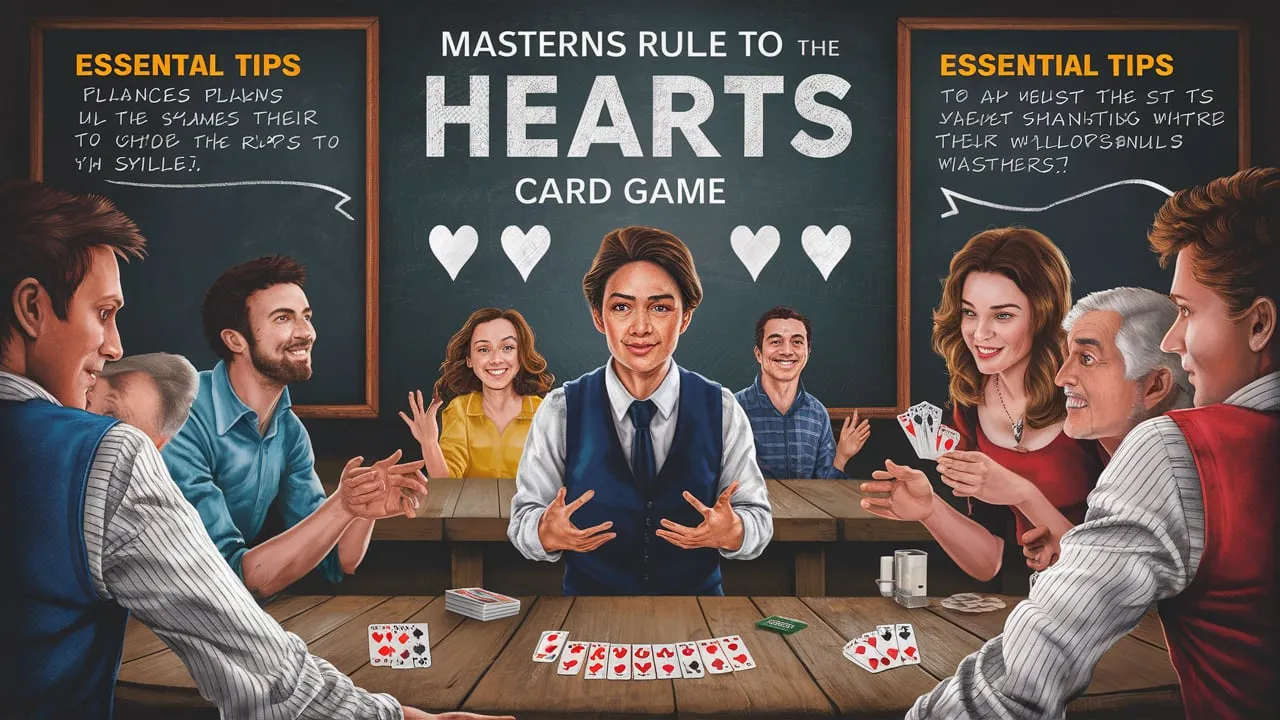Introduction
Hearts is a classic card game that requires a mix of strategy, skill, and a bit of luck. Whether you are a novice looking to get started or a seasoned player aiming to refine your skills, mastering the nuances of Hearts can significantly enhance your gameplay. This guide delves into the basics, essential strategies, advanced tips, and common pitfalls to help you become a formidable Hearts player.
Understanding the Basics of Hearts Card Game
The Objective of the Game
The primary objective of Hearts is to score the fewest points possible. Each round, players aim to avoid winning certain cards that carry penalty points, particularly Heart cards and the Queen of Spades. At the end of the game, the player with the lowest score wins. Generally, a game of Hearts is played until one player reaches a pre-determined score, often 50 or 100 points.
Players often strategize on how to avoid taking tricks that contain these high-point cards. This requires not just skill in playing the cards, but also an understanding of your opponents’ tendencies and potential strategies.
Understanding the Scoring System
Scoring in Hearts is quite straightforward. Each Heart card is worth one point, and the Queen of Spades is worth thirteen points. During the game, players will accumulate points based on the cards they win in tricks. It’s essential to keep track of your scores throughout the game to gauge your standing relative to your opponents.
The concept of “shooting the moon,” where a player tries to take all the penalty cards in a single round, adds an exciting twist to the scoring system. Successfully achieving this can grant you the coveted 0 points for that round while giving all your opponents a hefty 26 points, drastically affecting their standings.
The Role of Different Cards
The 52 cards in a standard deck play specific roles in Hearts. Players must recognize the significance of each card due to their values and their influence on gameplay strategy. For instance, Spades are often considered “trump” cards; winning Spade tricks early on can help you control the flow of the game.
Additionally, understanding the significance of low cards (like 2s, 3s, and 4s) can be beneficial. These cards can help you avoid taking unwanted tricks while keeping more valuable cards hidden for strategic uses later in the game.
Essential Strategies for Winning Hearts
When to Pass Cards
At the beginning of every round, players must pass three cards to opponents. Choosing the right cards to pass is crucial and can greatly influence the game’s outcome. Consider the cards in your hand: do you have high cards that could lead you to take a trick you want to avoid?
Passing high Hearts or the Queen of Spades can be an effective tactic to safeguard your score. Alternatively, sending low cards can mislead opponents and open opportunities for you later in the game.
The Importance of Tracking Cards
Keeping track of which cards have been played is an essential skill in Hearts. By doing this, you can better gauge what your opponents might have left in their hands, effectively predicting their moves. This will allow you to strategize your plays more wisely.
Several players develop personal systems or mental notes to track key cards, especially high-scoring ones. This information becomes especially valuable during crucial gameplay moments, helping you decide whether to risk playing a high card or to hold on for a better opportunity.
Deciding When to Shoot the Moon
Shooting the moon is a high-risk maneuver that can lead to significant rewards or disastrous penalties. Before attempting this strategy, assess your hand carefully. If you possess many high-value cards and a good mix of suits, it may be the perfect moment to pursue this strategy.
However, be cautious; if you fail and end up taking even one penalty card, the points may have dire consequences for your overall score. Typically, it’s advisable to attempt shooting the moon only when you feel confident in your abilities and have a solid grasp of other players’ hands.

Advanced Tips for Mastering Hearts
Managing Your Hand Effectively
Effective hand management is vital for thriving in Hearts. Begin by categorizing your cards based on their values and suits. Aim to maintain a mix of high and low cards to have flexibility in different rounds.
Prioritize offloading high-value cards when you can eliminate risks to your score. Conversely, holding onto low cards can be a shield against accumulating points, enabling you to control the pace and flow of the game.
Reading Your Opponents
Observing your opponents and understanding their strategies can give you the edge in Hearts. Pay attention to which cards players are consistently winning tricks with and how they react to certain plays. This information can indicate their hand strength and intentions.
By successfully interpreting their play styles, you can adapt your strategies accordingly, either challenging their approach or leveraging their weaknesses.
Adapting Your Strategy Mid-Game
Flexibility is a key trait of a successful Hearts player. As the game progresses, conditions can change rapidly based on the cards played and the strategies used by your opponents. Be ready to adjust your tactics based on the flow of the game.
If you notice opponents aggressively pursuing penalty cards, you may need to pivot and play more cautiously, focusing on minimizing your own score instead. Adapting smartly can turn the tide in your favor and lead to victory.
Common Mistakes to Avoid in Hearts
Mismanaging High-Value Cards
One of the common pitfalls in Hearts is mismanaging high-value cards such as the Queen of Spades or high Hearts. Winning these cards can lead to unwanted penalty points, so it’s critical to approach them with caution. Holding onto them until the right moment can help reduce risks.
A clever approach is to gauge the cards other players might have before deciding whether to play these high-value cards in a trick.
Ignoring the Power of Low Cards
Some players often underestimate the utility of low cards. While they may not seem significant, low cards can serve critical roles in avoiding points and controlling tricks. Use them strategically to deflect penalties and force your opponents to play higher cards.
Smart management of low cards can also protect your high-value cards by utilizing them defensively.
Failing to Adapt to Opponents’ Strategies
Hearts is not a game solely reliant on personal strategy; it’s equally about understanding and reacting to your opponents. Failing to acknowledge the changing dynamics introduced by other players can lead to predictable outcomes and missed opportunities.
Keeping an eye on your opponents’ tendencies, such as their willingness to take risks or how they play specific cards, will provide insights that are invaluable in your decision-making process. Adaptation will not only improve your play but can also enhance the overall experience.
Through these comprehensive tips and strategies, you will develop a robust understanding of the Hearts card game. By mastering the fundamentals, employing effective strategies, adapting mid-game, and avoiding common mistakes, you’ll elevate your gameplay and increase your chances of success on the table.

Leave a Reply